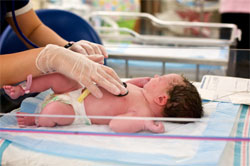
The three traditional training and educational tracks to registered nursing are a bachelor's degree, an associate degree, and a diploma from an approved nursing program. The most common degrees chosen by individuals going into this vocation are the bachelor's degree and the associate degree. Individuals will then have to complete a national licensing test if they wish to obtain a nursing license. If a nurse chooses to become a nurse-midwife, advanced practice nurse, nurse anesthetist, nurse practitioner, or clinical nurse specialist, they'll need to have a master’s degree.
Choosing to get a bachelor's degree in nursing usually means you'll be going to school and training for approximately four years. You are looking at about two to three years of education and training if you want to get your associate degree. Diploma programs are about three years and are typically done in a hospital. No matter which degree option they choose, licensed graduates should be ready for an entry level job as a staff nurse. You will find lots of RN degree programs that result in an ADN or bachelor’s degree; but, there are very few diploma programs.
Individuals may want to give consideration to the advantages and disadvantages for each program before choosing. There are going to be less chances for advancement for individuals that acquire the ADN, when compared to individuals that go for the bachelor of science in nursing and higher.
As a result of the increasing complexity of the nursing profession, the skills acquired by those individuals that complete a BSN are becoming more important. Furthermore, bachelor degree programs offer more clinical experience in non-hospital settings. A BSN degree, or higher is typically required by teaching and administrative positions.
It's not uncommon for a nurse that initially decided to get an associate degree, or diploma, to go back to college and acquire a bachelor’s degree. In most instances, nurses will begin by finding work in an entry level job. Then, after they start working, they're now able to use tuition reimbursement options. Signing up for a MSN program and earning their master’s degree is a second option. These kinds of degree programs generally take about 3-4 years to finish and will result in the RN earning their bachelor’s degree, in addition to their master’s degree.
There are degree programs available for individuals thinking about changing to a profession in the nursing field too. There are accelerated Bachelor of Science in Nursing programs available if you already have got a bachelor's degree in another area. Most of these accelerated programs normally last about a year, to a year and a half. For people who already have a bachelor's degree, another choice is a master's degree program.
All nursing education programs include classroom instruction along with supervised clinical experience in healthcare facilities. Students will take lessons in microbiology, psychology, physiology, chemistry along with other nursing and behavioral sciences. Coursework also includes the liberal arts for associate degree and bachelor degree students.
Supervised clinical training is provided in healthcare facility departments such as psychiatry, surgery, maternity and pediatrics. Several training programs also have clinical training in public health departments, home health agencies, ambulatory clinics and nursing care facilities.
In order to get a registered nursing license in the U.S., individuals will need to graduate from an approved nursing program then pass the NCLEX-RN exam. There are typically additional licensing prerequisites that will vary based on location. Contact your State’s board of nursing for specifics.
Being credentialed in a particular career field is an option that a lot of nurses choose. RNs have several options when credentialing. Two of those options are with the National League for Nursing and the American Nursing Credentialing Center. In general, RNs are not required to get credentialed, nevertheless it demonstrates dedication to a greater standard.
Considering the nature of the job, it is vitally important that those looking at becoming a Registered Nurse be caring and sympathetic. It's important they be prepared to correctly assess patients' conditions, determine when consultation is required and direct or supervise others. Above all, they should need to know how to address traumatic situations as well as human suffering.
A majority of RNs will start their careers by working as a staff nurse in a hospital. As they obtain more practical knowledge, they'll typically move into various other locations and get promoted to opportunities that offer significantly more responsibility. In management, nurses are able to advance from head nurse to more senior level administrative roles of vice president, chief of nursing, assistant director, or director. More and more, management level nursing positions call for a graduate or advanced degree in health services administration, or nursing. Administrative roles demand leadership, communication, negotiation skills and good judgment.
Yet another way for registered nurses to advance their opportunities is by becoming advanced practice nurses. These types of highly trained professionals are able to work independently, as well as in collaboration with a physician and sometimes concentrate on providing primary care. The following is a list of advanced practice nurses. Nurse Anesthetists, Nurse-Midwives, Nurse Practitioners and Clinical Nurse Specialists. The nurse practitioners work as primary health care providers, offering a blend of nursing and healthcare services to people and their families. Individuals working as clinical nurse specialists will be providing patient care in one of many areas of expertise. Examples include Rehabilitation , School Health Nursing. Nurse anesthetists offer patients anesthesia along with related care both before and after obstetrical, therapeutic and diagnostic procedures. Additionally, they are able to provide pain management and emergency services, like airway management. Nurse-midwives provide care to women, including prenatal care, assistance in labor and delivery, gynecological exams, neonatal care and family planning advice.
No matter which advanced practice nurse discipline you end up picking, you need a master's degree. Along with the requirement of a master's degree, each state has some specifications for registered nurses being employed in advanced practice roles. Speak to your State’s board of nursing for specific regulations regarding advanced practice nurses.
Some nurses step into the business side of health care. Companies, like insurance companies, managed care organizations and hospitals, among others, need RNs for policy development, marketing, quality assurance as well as consulting.


 The term midwife makes one think of women having a baby on their floor, but in fact there is a midwife certification enabling midwives to give alternatives for their patients’ childbirth experience together with a number of career choices for nurse midwives. Midwife career choices include:
The term midwife makes one think of women having a baby on their floor, but in fact there is a midwife certification enabling midwives to give alternatives for their patients’ childbirth experience together with a number of career choices for nurse midwives. Midwife career choices include: RNs now have the choice of going after a neonatal nursing path, which is relatively new as compared to more common nursing career options; and neonatal nursing is a specialty with many different openings for trained professionals that want to work with new infants. Neonatal nurses handle premature and chronically ill babies, along with their mothers, who need support and coaching to care for their babies.
RNs now have the choice of going after a neonatal nursing path, which is relatively new as compared to more common nursing career options; and neonatal nursing is a specialty with many different openings for trained professionals that want to work with new infants. Neonatal nurses handle premature and chronically ill babies, along with their mothers, who need support and coaching to care for their babies.
